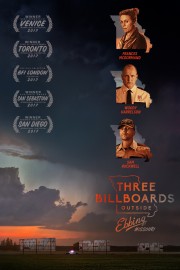Three Billboards Outside Ebbing, Missouri
I don’t intend it to be an insult when I say that Martin McDonagh’s “Three Billboards Outside Ebbing, Missouri” reminds me of a Coen Brothers film- specifically, their 1996 masterpiece, “Fargo.” It’s not just because of the presence of Frances McDormand in the lead role, or the familiar colors of composer Carter Burwell. There’s a deft hand with drama and humor at work here that is familiar, whether you’re thinking back to McDonagh’s own work (“In Bruges,” “Seven Psychopaths”) or to the wild worlds of Joel and Ethan Coen. That dark edge isn’t immediately clear in “Three Billboards,” however, as we first become familiar with the pain behind the actions of McDormand’s Mildred Hayes, who goes to unorthodox lengths to make sure her daughter, Angela, is not forgotten after she is raped and murdered, but as we become more familiar with the characters at the heart of their story, we are opened up to the wicked humor they show us, and accept it as a natural part of their character. “Fargo” is a more apt comparison than you might realize.
I cannot imagine that anybody involved in “Three Billboards Outside Ebbing, Missouri” could have believed at how timely the film would feel when they were making it. At its heart, this is about a woman looking for justice from a system that doesn’t allow for it, and if it does, not in a timely manner. In the aftermath of the beginning of the #metoo movement, wherein women have shared stories of harassment and sexual abuse at the hands of powerful men, and Harvey Weinstein, Bill O’Reilly, and Louis CK, among others, have been called out for their deplorable behavior towards women, Mildred’s campaign, wherein she has bought three billboards on a road in Missouri asking for the Ebbing police chief, Bill Willoughby (Woody Harrelson), to be held accountable for the lack of work that seems to be going into finding the person who killed her daughter, feels of a piece with what these real-life women are doing. Mildred ruffles not only Willoughby’s feathers, but those of most everyone else in the town, even, to an extent, her own son (Lucas Hedges), who has been sullen since Angela’s death, and doesn’t appreciate the 20-foot-high reminders of it. One of the smartest things about McDonagh’s film is that it doesn’t see the actions of many of the characters in stark black-and-white, right and wrong terms, but rather on a spectrum. What Mildred is doing is morally right, but when you consider Willoughby’s perspective as someone who knows how cases can go “cold,” and rumors of his declining health, you understand that she’s exasperating a delicate matter by implying no one cares about it but her. Similarly, the reaction of Willoughby and the other cops, especially Dixon (Sam Rockwell), a hothead who has been accused of racially-motivated violence against prisoners, are certainly understandable, but seeing the passion of Mildred can only result in empathy for how she sees the situation, and a renewed understanding of what their job entails. So much of what makes this film unexpected in how funny it is has to do the with subject matter, but also in how honestly it portrays its characters, and the situation, at the beginning of the film. This is serious business, but we shouldn’t be surprised by the bursts of humor that comes out, which are all character-based, and all in keeping with them from beginning to end. In many ways, Mildred completely reminds me of Marge Gunderson, McDormand’s police chief in “Fargo,” but in other ways, she’s completely different- her comedic attitude with her kids being one example- and it’s such a rich melding of writing and performance that you can’t help but be impressed with how McDormand pulls it off. Similarly, Woody Harrelson does some of his best work to date as Willoughby, which seems like a simple role, but, in fact, as shades of reflection to the character even after he’s exited the movie in the form of letters to key characters. Harrelson has long been removed from the role that made him famous on “Cheers,” but McDonagh is able to bring a little bit of that warmth back to him here, and it’s a fine summation of his career thus far. I’d say he has a clear path to his first Oscar, but he has some stiff competition from his co-star, Rockwell, who brings back memories of his brutal prison guard in “The Green Mile,” but adds layers to him as we see him at home with his mother (Sandy Martin), and see how getting burned in a fire at the police station has an impact on the character’s rough edges. All three stars turn in sterling work, and it’s when we get the chance to see them play off of one another that the film really takes hold.
If I had to levy a criticism about the film, it’s that the way it plays out in the end is not quite as honest as its beginning, even if it feels like it when a chance encounter in a bar leads to a possible lead in the case. There’s a lot of truth in McDonagh’s film, but it doesn’t always play true with reality. That’s where it’s limitations as a movie come into play, but that’s also a minor quibble when you get such strong work out of three of the most interesting actors in movies over the past 30 years. Their work is always honest to the characters they play, and it’s what makes “Three Billboards” a memorable piece of filmmaking.










